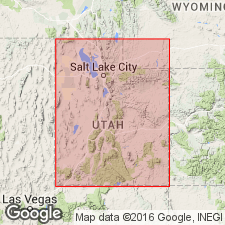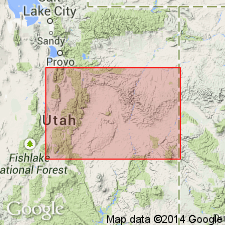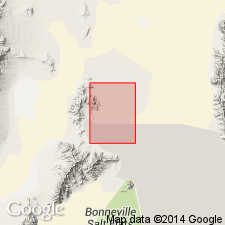
- Usage in publication:
-
- Candland Shale Member
- Modifications:
-
- First used
- AAPG geologic province:
-
- Great Basin province
Summary:
Candland Shale Member shown in correlation table as second from bottom of five members of the Orr Formation in the House Range, UT. Age is Late Cambrian (Dresbachian).
Source: GNU records (USGS DDS-6; Menlo GNULEX).

- Usage in publication:
-
- Candland Shale Member*
- Modifications:
-
- Principal reference
- Dominant lithology:
-
- Shale
- AAPG geologic province:
-
- Great Basin province
Summary:
Pg. G3, G5-G6, G12 (fig. 4), G13-G15, G19 (fig. 5), G21+. Candland Shale Member of Orr Formation. Medium- to dark-gray, thin-bedded to massive calcisiltite interbedded with medium-gray, thin-bedded, silty calcarenite that forms prominent ledges, and poorly exposed, thin-bedded, brown-weathering limestone with some shaly partings. Thickness 412 feet (1,256 m) thick at type, where it conformably overlies Big Horse Limestone Member (new) and conformably underlies Johns Wash Limestone Member. Correlative with part of Steamboat Pass Shale Member of Orr Formation in Wah Wah Mountains, and with parts of Lincoln Peak Formation of southern Snake Range, Hicks Formation of Deep Creek Range, Straight Canyon Formation of Dugway Range, and Opex Formation of East Tintic Mountains. = unit 1e of Orr Formation (C.D. Walcott, 1908, Smithsonian Misc. Coll., v. 53, no. 4, p. 175). Is most fossiliferous member of Orr Formation. Fossils [listed] include trilobites and phosphatic brachiopods; contains specimens representative of CREPICEPHALUS, APHELASPIS, DICANTHOPYGE, PREHOUSIA, and DUNDERBERGIA trilobite assemblage zones. Age is Late Cambrian.
Type section (= type section of Orr Formation): on northeastern side of Orr Ridge, along unnamed ridge between Little Horse Canyon and Big Horse Canyon, in east-central part of sec. 33 [unsurveyed], T. 18 S., R. 13 W., [approx. Lat. 38 deg. 12 min. 00 sec. N., Long. 113 deg. 18 min. 48 sec. W.], Notch Peak 15-min quadrangle, Millard Co., House Range, west-central UT.
Named from exposures at mouth of Candland Canyon, which drains south side of Orr Ridge, House Range, Millard Co., west-central UT.
[Additional locality information from USGS historical topographic map collection TopoView, accessed Memorial Day 2018.]
Source: Publication; US geologic names lexicon (USGS Bull. 1564, p. 27).

- Usage in publication:
-
- Candland Formation*
- Modifications:
-
- Revised
- Overview
- Areal extent
- AAPG geologic province:
-
- Great Basin province
Summary:
Candland Shale Member of the Orr Formation is raised in rank [locally] at Crater Island in the Lucin 4 SW 7.5' quad, Box Elder Co, UT. Consists predominantly of calcareous shale and silty limestone, forming a bench between more resistant adjacent units. Is marked by two distinctive brown to red, quartz-sand zones near top and bottom of formation. Thickness is about 58 m. Overlies [conformably] the Big Horse Limestone (rank raised) and underlies [conformably] the Johns Wash Limestone. Candland Formation at Crater Island is correlated with the Dunderberg Shale (Robison and Palmer, 1968). Strata previously assigned to the Wheeler Shale (Schaeffer, 1960). Age is Late Cambrian.
Source: GNU records (USGS DDS-6; Menlo GNULEX).
- Usage in publication:
-
- Candland Shale Member*
- Modifications:
-
- Areal extent
- AAPG geologic province:
-
- Great Basin province
- South Western Overthrust
Hintze, L.F., and Davis, F.D., 2003, Geology of Millard County, Utah: Utah Geological Survey Bulletin, no. 133.
Summary:
Pg. 62, 299 (Corr. Chart 1, Cambrian). Candland Shale Member of Orr Formation. Olive shale interbedded with medium-gray, thin-bedded, fossiliferous calcisiltite and calcarenite. Thickness up to 412 feet (125.6 m). Notable exposures in House Range and Cricket Mountains, Millard County, Utah. Overlies Big Horse Limestone Member and underlies Johns Wash Limestone Member (both of Orr Formation). In southern House Range and Wah Wah Mountains, where the Johns Wash is absent, merges with Corset Spring Shale Member to form Steamboat Pass Shale Member of Orr Formation. Fossils (trilobites, brachopods). Age is Late Cambrian [Lincolnian (Marjuman)]; trilobite zones CREPICEPHALUS, APHELASPIS, DICANTHOPYGE, PREHOUSIA, and DUNDERBERGIA.
Source: Publication.
- Usage in publication:
-
- Candland Shale Member*
- Modifications:
-
- Areal extent
- AAPG geologic province:
-
- Great Basin province
Miller, J.F., Evans, K.R., and Dattilo, B.F., 2012, The great American carbonate bank in the miogeocline of western central Utah; Tectonic influences on sedimentation; Chapter 31: American Association of Petroleum Geologists Memoir, 98, p. 769-854.
Summary:
Pg. 796-798. Candland Shale Member of Orr Formation. Poorly exposed olive shales interbedded with better exposed silty, bioclastic limestones, including beds with abundant trilobites, oncoids, and organophosphatic brachiopods. Is a slope-forming unit. Thickness about 412 feet (126 m) at Orr Ridge, central House Range, and about 165 feet (50 m) in Cricket Mountains. Overlies Big Horse Spring Limestone Member and underlies Johns Wash Limestone Member, both of Orr Formation. In Steamboat Pass area and Wah Wah Mountains, where Johns Wash is absent, the Candland and younger Corset Spring Shale Member merge to form the Steamboat Pass Shale Member of Orr Formation. Fossils (abundant trilobites); taxa diagnostic of APHELASPIS, DICANTHOPYGE, PREHOUSIA, and DUNDERBERGIA trilobite assemblage zones. Is basal unit of Upper Cambrian provincial Laurentian Steptoean Stage of the Millardan Series (A.R. Palmer, 1998, Canadian Jour. Earth Sci., v. 35, p. 323-328). [See also J.F. Taylor and others, Chap. 3, this vol., and references therein.] Age is earliest Late Cambrian.
Source: Publication.
For more information, please contact Nancy Stamm, Geologic Names Committee Secretary.
Asterisk (*) indicates published by U.S. Geological Survey authors.
"No current usage" (†) implies that a name has been abandoned or has fallen into disuse. Former usage and, if known, replacement name given in parentheses ( ).
Slash (/) indicates name conflicts with nomenclatural guidelines (CSN, 1933; ACSN, 1961, 1970; NACSN, 1983, 2005, 2021). May be explained within brackets ([ ]).

